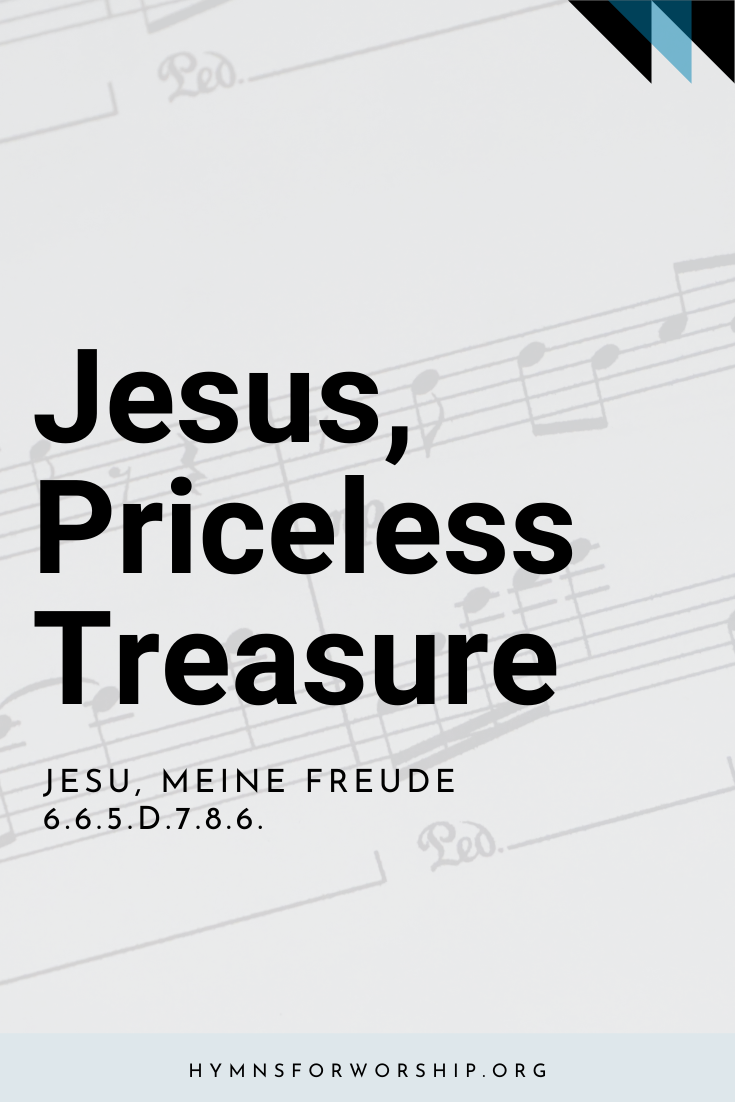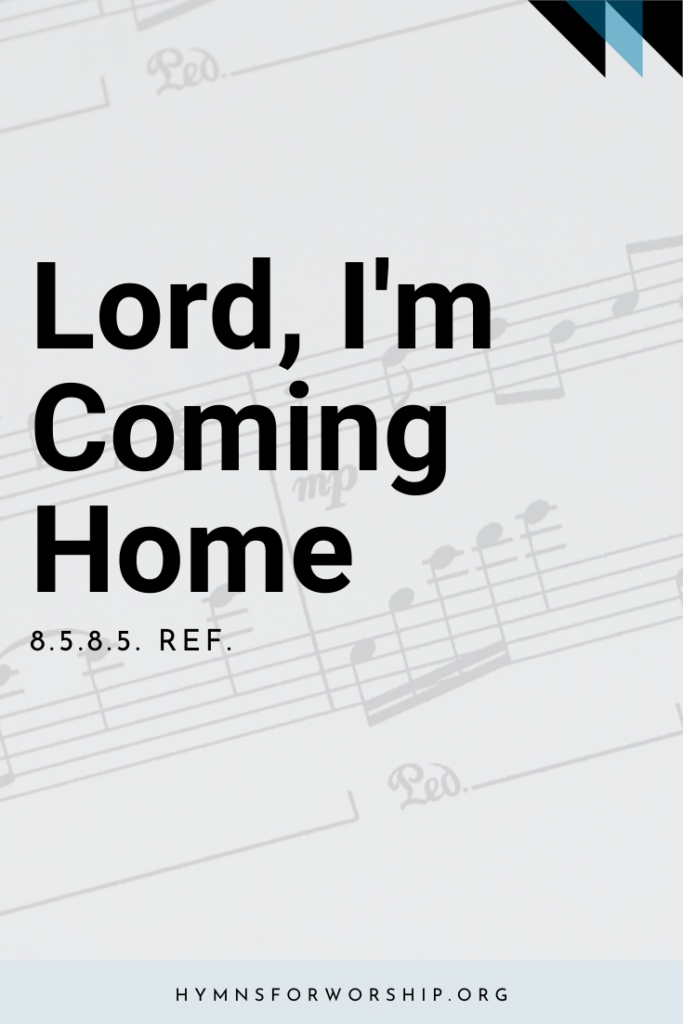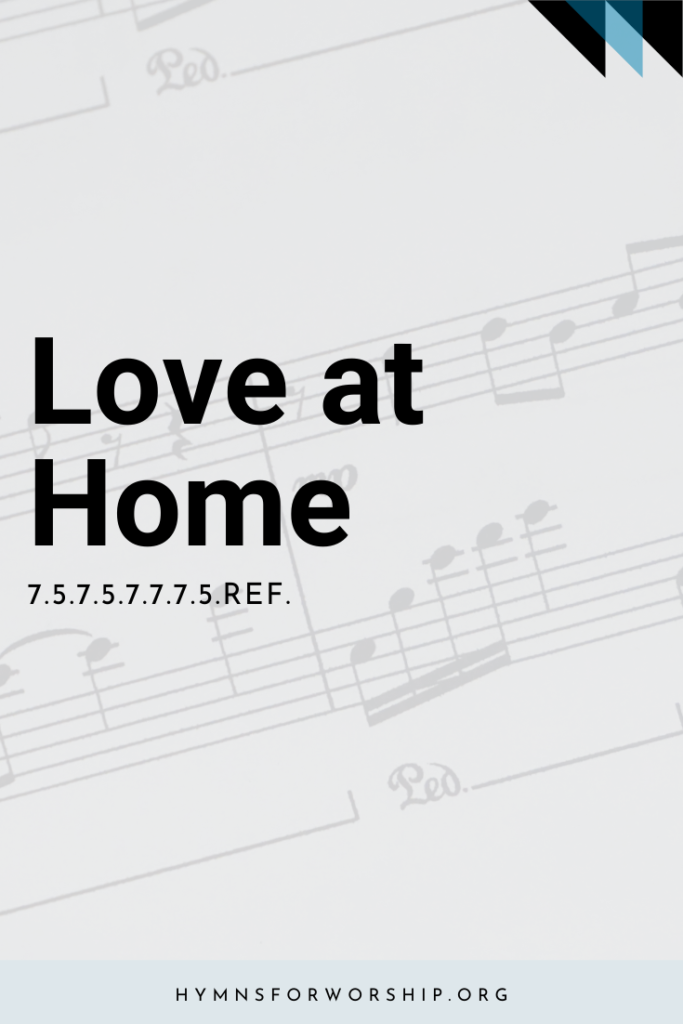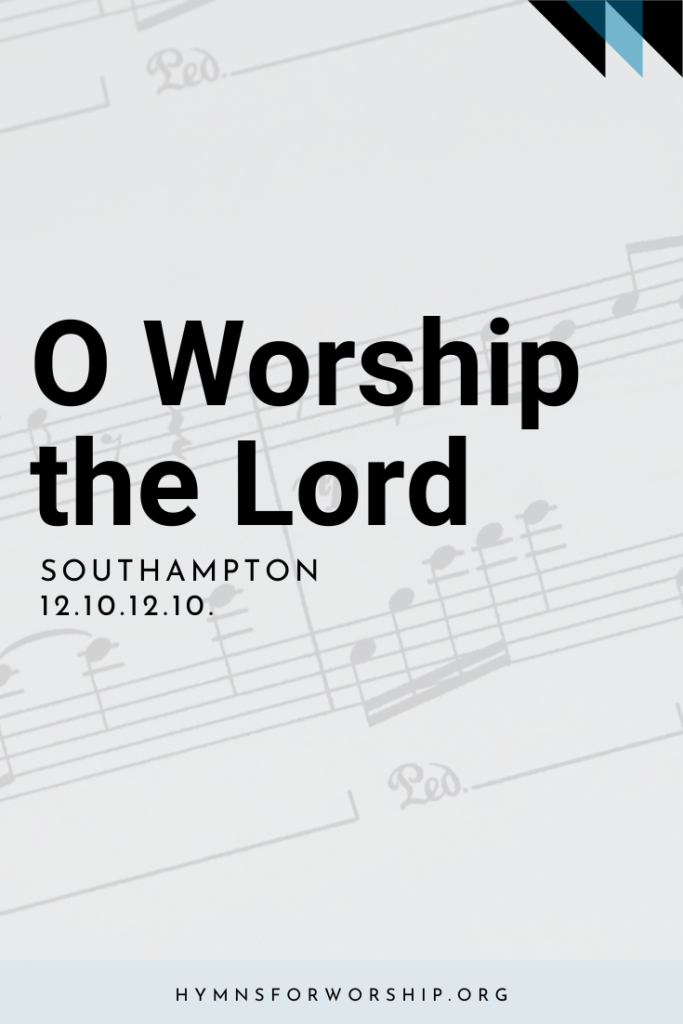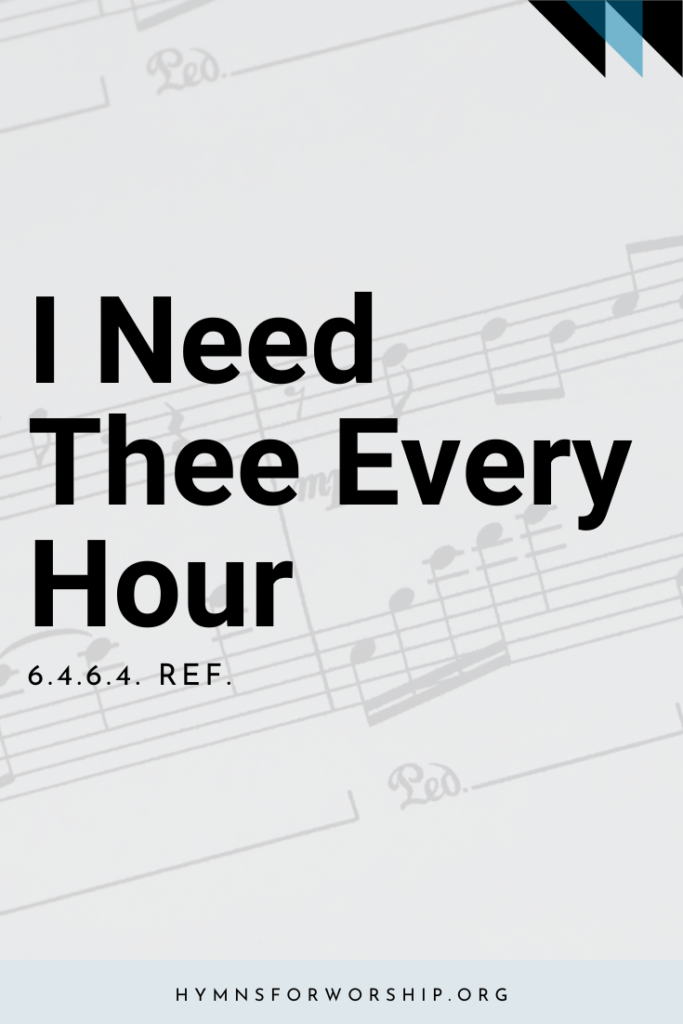JESUS CHRIST >> GLORY & PRAISE
SDAH 239
Jesus, priceless Treasure, Source of purest pleasure, Truest Friend to me:
Ah! how long I’ve panted, And my heart has fainted, thirsting, Lord, for Thee.
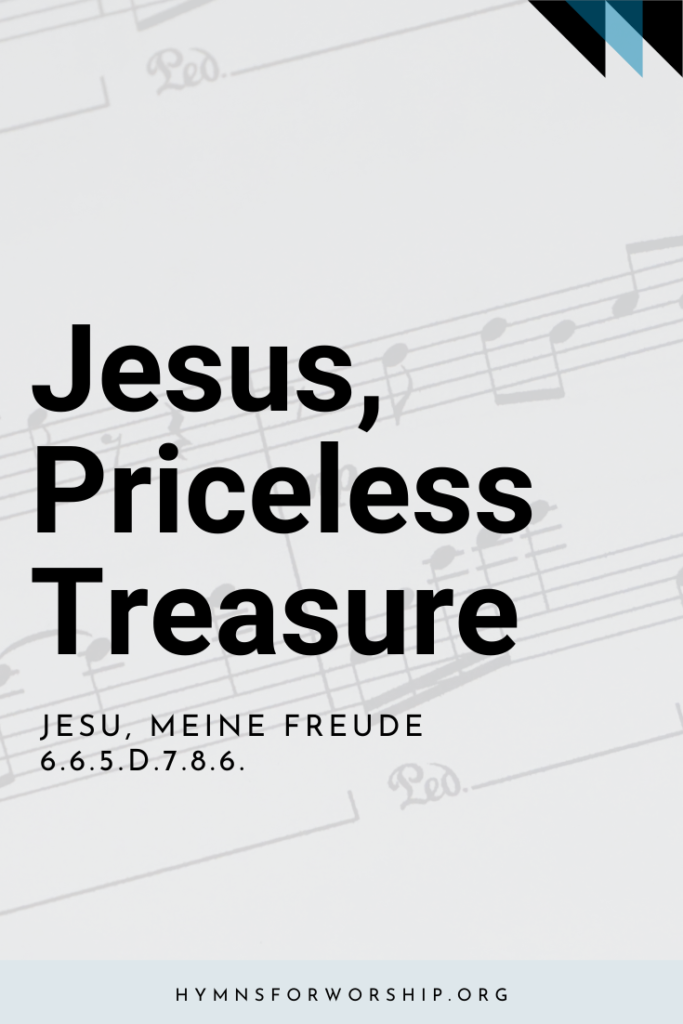

Text
1
Jesus, priceless Treasure, Source of purest pleasure, Truest Friend to me:
Ah! how long I’ve panted, And my heart has fainted, thirsting, Lord, for Thee.
Thine I am, O spotless Lamb, I will suffer naught to hide Thee,
Nought I ask beside Thee.
2
In Thine arms I rest me; foes who would molest me Cannot reach me here.
Though the earth be shaking, Every heart be quaking, Jesus calms our fear.
Sin and hell in conflict fell, With their bitter storms assail me,
Jesus will not fail me.
3
Hence, all thought of sadness! For the Lord of gladness, Jesus, enters in.
Those who love the Father, Though the storms may gather, still have peace within;
Yea, whatever we here must bear, Still in Thee lies purest pleasure,
Jesus, priceless Treasure!

Hymn Info
Biblical Reference
(a) Matt 13:46; Ps 42:2 (b) Deut 33:27, Ps 46:2 (c) John 16:33
Author
Johann Franck (1618-1677)
Translator
Catherine Winkworth, 1863 (1827-1878)
Hymn Tune
JESU MEINE FREUDE
Metrical Number
6.6.5.D.7.8.6.
Composer
Meloy by Johann Cruger (1598-1662)
Arranged
Johann S. Bach (1685-1750)
Theme
GLORY AND PRAISE
Hymn Score
Piano Accompaniment
Recommended Reading
The general idea when it comes to hymns is that there is a close bond between the author and the composer. That the author writes a hymn and the composer invents a tune to suit it, and then provides the harmony to accompany the tune. However, such wasn’t always the case.
Many hymns actually worked vice versa wherein authors would write verses according to existing tunes. Hundreds of hymns are sung from borrowed tunes, such as secular songs, chants, and even classical works. That being said, I went ahead and researched which hymns in the SDA Hymnal were originally classical works.
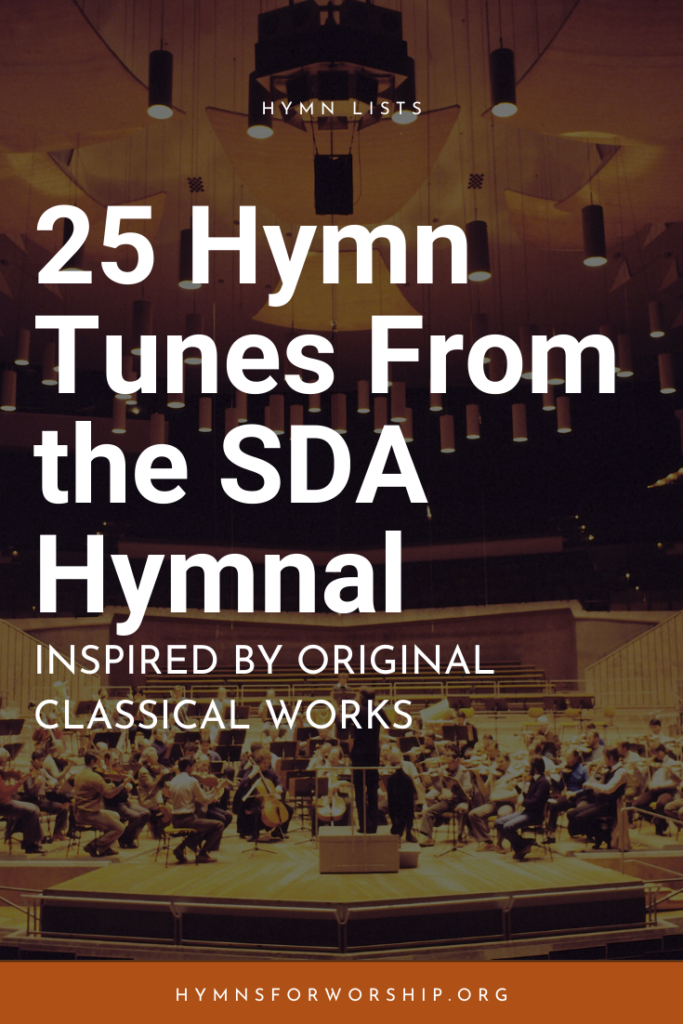
Notes
Get to know the hymns a little deeper with the SDA Hymnal Companion. Use our song leader’s notes to engage your congregation in singing with understanding. Even better, involve kids in learning this hymn with our homeschooling materials.
Three of the four people involved in this beautiful, intensely personal hymn of love for Christ carry the name “Johann” or John! It first appeared with this melody in Johann Cruger’s Praxis Pietatis Melica, Frankfurt, 1653. Apparently it was patterned after a love song, “Flora Meine Freude; Meiner Seelenweide” (Flora, My Joy, Food Of My Soul), in H. Alberti’s book Arien, 1641. When it begun to achieve popularity, many of the more conservative Lutherans in Germany felt it was much too personal for use in the corporate worship of the church. But it continued to gain favor and was translated into Estonian in 1667; into Russianin 1724, at the command of Peter the Great; and into Latin. There were six stanzas.
Catherine Winkworth (1827-1878; see Biographies) wrote, “This is one of his most celebrated hymns, but from its peculiar meter it loses much in translation.” The meter actually is 6.6.5.6.6.5.3.4.8.6., thus making it a 10-line stanza, as lines 7 and 8 rhyme, e.g., am—Lamb, hell—fell, and whate’er—bear.
Johann Franck was born June 1, 1618, at Guben, Germany, and studied law at the University of Konigsburg, the only German university left undisturbed by the Thirty Years’ War. After two years, he returned home to be with his mother during the times of suffering in Guben brought on by the presence of both Swedish Saxon troops. He spent 32 years as a lawyer, town burgees, and councilor. John Julian says, “As hymn writer he holds a high rank and is distinguished for unfeigned and firm faith, deep earnestness, finished form, and noble, pithy simplicity of expression”. In his “Jesus, Priceless Treasure” we noticed a longing for the inward and mystical union of Christ with the soul.” One hundred ten of his hymns psalm versions were collected in his Gesitliches Sion, Guben, 1674. He died at Guben on June 18, 1677.
A number of English translations have been made; this one by Catherine Winkworth was included in her Chorale Book Of England, 1863, and Christians Singers of Germany, 1869. When Cruger printed JESU, MEINE FREUDE (Jesus, My Joy) in Praxis Pietatis Melica (The Practice of Musical Piety) mentioned above, he marked it “traditional melody”. But he can almost certainly be given credit for altering it into hymn form. Johann Cruger was born April 9, 1598, at Gross-Breese (near Franck’s hometown), Germany. He attended a “poet’s school” at Regensburg, where he also studied music under Homberger, a pupil of the famous Gabrieli of Venice. After theological study at the university of Wittenburg and work as a private tutor in Berlin, he became cantor of St. Nicholas’ Church, Berlin, and a teacher in the Gymnasium of the Grey Cloister, position he held for 42 years until his death on February 23, 1662. He was one of the most distinguished musician of his time, but his main claim to fame is Praxis Pietatis Melica, a book of high quality hymn and tunes he collected and published, which became the chief source of tunes for later Lutheran hymnals. Julian regarded it as “the most important work of the century.” Revised and enlarged many times for nearly a hundred years, the final edition has more than 1,300 hymns. His other tunes in SDAH are No. 267, GRAFENBERG, and No. 559, NUN DANKET.
A favorite melody of J. S. Bach (1685-1750; see Biographies), he used it Cantatas 12, 64, 81, and 87, as well as four organ works found in Orgelbucklein and in Miscellaneous Preludes. The SDAH version is as he harmonized it for the first chorale of his motet “Jesu, Meine Freude,” which was composed in 1723 especially for the funeral service of Frau Kase, wife of the postmaster at Leipzig. The Fourth-Part Chorales of J. S. Bach by Charles Sanford Terry (Oxford University Press), contains four harmonization of this tune.
–from Companion to the Seventh-day Adventist Hymnal by Wayne Hooper and Edward E. White

